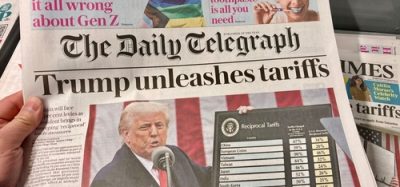Brexit – it’s an opportunity!
- Like
- Digg
- Del
- Tumblr
- VKontakte
- Buffer
- Love This
- Odnoklassniki
- Meneame
- Blogger
- Amazon
- Yahoo Mail
- Gmail
- AOL
- Newsvine
- HackerNews
- Evernote
- MySpace
- Mail.ru
- Viadeo
- Line
- Comments
- Yummly
- SMS
- Viber
- Telegram
- Subscribe
- Skype
- Facebook Messenger
- Kakao
- LiveJournal
- Yammer
- Edgar
- Fintel
- Mix
- Instapaper
- Copy Link
Posted: 12 May 2022 | Bethan Grylls (New Food) | No comments yet
New Food’s Bethan Grylls shares the highlights of a royally attended meeting between UK and Belgium industry and government leaders, wherein the future of trade in a post-Brexit world was explored in detail.


This week, Princess Astrid, representing the King of Belgium, visits the UK to lead an economic mission that will see the two countries celebrating and cementing their longstanding trade relationships.
This is the first ‘mission’ of its kind to take place since the beginning of the pandemic and comprises more than 400 participants, 214 companies and four days of activities in the Greater London area. Among those activities, Belgium players in Great Britain will have the opportunity to further their understanding of UK exporting regulations (present and future) as well as retail markets.
I was fortunate to be invited to one part (9 May 2022) of the event, which took place at the Intercontinental near Hyde Park in London. Here, the delegates heard from an array of industry and governmental figureheads from both the UK and Belgium. The key message being that Brexit is an opportunity.
It was refreshing to hear trade talks spoken of in such an optimistic manner and this was a view shared by many of the speakers.
“I am utterly sick of talking about the negativity of Brexit,” said Dominic Goudie, Head of International Trade at the Food & Drink Federation (FDF), while Daan De Vlieger, Director of Global Trade Advisory at Deloitte, who described Brexit as “still a challenge”, suggested we discuss those hurdles against a backdrop of highlighting opportunities.
The challenges were aptly described by Ilke Bliki, Flanders Investment & Trade’s Brexit Co-ordinator, and Vlieger during their sessions. The rules of origin were a particular focus during their talks, which Bliki likened to “learning a new language”.
Indeed, the current and upcoming rules that Brexit has forced upon trade are a bit of a headache, to say the least. But both Bliki and Vlieger did a sterling job of explaining some of the key obstacles as well as solutions to overcome them. They too – alongside the other speakers – flagged the opportunities that await both the UK and Belgium if trade is managed efficiently.
What on earth are rules of origin?
Prior to Brexit, the UK and EU had an agreement that enabled products to enter and leave without duties. Now, a 12 percent duty rate has been applied.
The UK’s departure from the EU ensures that trade relations are governed by the provisions of the Trade and Cooperation Agreement (TCA) – you can read the TCA here – between the EU and the UK that came into force in 2021. The TCA leaves room for individual member states to build further cooperation with the UK, provided it’s in line with its principles.
The rules of origin come under the UK’s deal with the EU and apply to businesses who want to import and/or export goods to and from the EU without incurring tariffs.
To be considered for zero or a reduced rate of customs duty, products must be sufficiently worked or processed within the countries in the agreement. Non-originating materials are those imported from countries outside of the UK and EU – it may also relate to materials whose origin cannot be determined.1
However, there are many ingredients which are outsourced from regions beyond the EU, such as sugar and many herbs and spices.
So, “is it better to abandon the UK market” as Vlieger questioned?
…“Definitely not.”
Vlieger noted that the good news about the new agreement is that the duty also impacts other countries outside the EU, which limits the competition. He also pointed to a few ways in which duties could be lowered or even avoided, namely through bonded warehouses and duty drawbacks.
Ok…but what exactly does that mean?
According to the UK Government: “For goods that were imported from the EU and are being returned or redistributed in the EU without obtaining UK origin, the importer in the EU may be able to claim Returned Goods Relief.
“If goods entered the UK under the internal Transit procedure (T2) and have not been entered into any customs procedure other than Transit or Customs Warehousing, they may be able to keep their EU status. This will mean that EU customs formalities, including duties and taxes, can be avoided.”
Ok…but…uhm…what does that mean?
Vlieger elaborated: “Bonded warehouses allow foreign goods to be physically present in either the EU or UK customs territory, whilst remaining under administrative customs supervision and therefore not subject to duties. Only once it is known what the ultimate destination of the product will be, a trader needs to decide what to do with the goods. That can be either re-exporting them out of the territory into the destination market or releasing them for free circulation (with payment of applicable duties, if any) locally.


Pictured: Daan De Vlieger speaking at The Intercontinental in London on 9 May 2022
“On the hand, the drawback provision that has been agreed under the TCA (for now, temporarily) allows manufacturers of products in either the UK or the EU to avoid duties that they incurred before the UK left the EU. Essentially, a combination of inward processing relief for inbound raw materials and duty preference for the finished product (if the local manufacturing operation qualifies as sufficient) allows manufacturers and traders to eliminate duty costs across the entire supply chain.”
Find out more about these initiatives here.
The key point from Bliki was “know your supply chain”.
Addressing those businesses looking to trade in the UK, she commented: “Know your responsibilities before you make commercial agreements. Talk to everyone within your logistics chain and don’t ship anything until this has been done. One small misunderstanding could risk delays.”
Vlieger also highlighted the importance of understanding the various commodity codes and getting them right. For example, the code for chocolate blocks is different to that of chocolate powder and one error could lead to fines.
An observation I made here is that as different codes also result in different duties, we may see alterations to recipes to help lower costs. It will be interesting to see how many manufacturers choose this path and how consumers react; particularly if an item has been available in the UK market for some time.
New labelling rules mean you need one UK address
Another important new ruling that will impact the UK’s trading partners is the labelling rules that will come into force this October.
The new legislation mandates that from 1 October 2022, packaged goods placed in the Great British market will require a UK address. If the company does not have an establishment in the UK, this will need to be the address of the UK importer. This must be a physical postal address; a PO box will not count.
Foreseen problems include cases where companies have more than one UK importer, as only a single UK address will be accepted.
Is it better to abandon the UK market? Definitely not.
Bliki raised this issue, suggesting one work around is to create a new label for every company – she did admit that this is not always a feasible option, however. Another way forward is to partner with a UK organisation that can handle the management of all importers and act as a main point of contact.
Numerous problems as a result of Brexit can be overcome by setting up in the UK and having a local establishment, Vlieger recommended.
Among new regulations, there will likely be a few divergences between what is allowed to be consumed in the EU and what is allowed in Great Britain. One example of this is the recent EU ban imposed on the food additive titanium dioxide (E171). For such differences, industry can refer to the EU-UK divergence tracker.
Further future controls
This July was scheduled to signal implementation of further controls in the UK; these were as follows:
- A requirement for further Sanitary and Phytosanitary (SPS) checks on EU imports currently at destination to be moved to Border Control Post (BCP)
- A requirement for safety and security declarations on EU imports
- A requirement for further health certification and SPS checks for EU imports
- Prohibitions and restrictions on the import of chilled meats from the EU.
However, these new rules have been postponed – a move which many speaking at the conference welcomed as the UK transitions to a digital border.
“The future is digital,” confirmed Bliki.
However, Vlieger warned that an indefinite postponement would be unwise. “It will last until the next food scandal,” he said, explaining that these measures are in place to protect everyone.
Imports are so important – without them we would not have this diversity.
The impact of these new rules when they eventually come into force will have an effect on time, route, scale and money. Not every BCP has the capacity to manage chilled goods, for example, so you may need to seek out another route.
Bliki also noted the advantage that grouping consignments will have. This is due to the fact that it amounts to the same level of paperwork (and cost) whether it’s a single meal or a truckload being imported.
As she concluded her speech, Bliki notified the mostly Belgium-based audience that the ability to adapt was a necessity if they want to trade with the UK.
The UK is operating on the basis that Belgium understands Brexit policies, she stated.
Brexit is an opportunity
The significance of a good UK and Belgium trade relationship was emphasised by Belgium and British guests alike.
Illustrating this, Simon Waring, Owner and MD at Green Seed, cited some interesting key findings around Google search terms from Brits.
Twenty percent of all searches for beer on Google include ‘Belgium’, likewise 20 percent of searches for waffles are for ‘Belgium waffles’, while 10 percent of searches for chocolate are for ‘Belgium chocolate’.
Commenting on these findings, he remarked: “There is great opportunity for Belgium in the UK market.”


“We are focused on innovation and pride ourselves on value, both in terms of quality and cost,” he added.
FDF’s Goudie echoed these sentiments: “Food and drink in the UK is a national success story. We are a creative, innovative and diverse industry – with [one of] the widest ranges of products at a great range of prices.
“Imports are so important – without them we would not have this diversity.
“Belgium will always remain important to what we do – they reflect our values and high-quality requirements.”
Goudie acknowledged that circumstances may have changed since the UK left the EU but countered that “there is no reason why we can’t grow our trade relationship further”.
Moreover, since Brexit, Belgium trade has not suffered. On the contrary, it’s been flourishing. “In 2021 our exports rose, seeing a 33 percent increase compared to 2019,” said Fevia’s CEO Bart Buysse.
Goudie added: “Manufacturers depend on imports for ingredients. We [the UK] have a huge ambition to export more and inevitably we’ll want to import more.”
Certainly, as Belgium is the UK’s seventh biggest export market, it’s good to know that the countries are working hard to cement future opportunities. I for one would be sad to hear that authentic Belgian chocolates were in short supply in the UK, and I am certain I’m not alone.
References
Related topics
Regulation & Legislation, retail, Trade & Economy, World Food
Related organisations
Deloitte, Fevia, Flanders Investment & Trade, Food and Drink Federation (FDF), Green Seed
Related regions
Related people
Bart Buysse, Daan De Vlieger, Dominic Goudie, Ilke Bliki, Princess Astrid, Simon Waring








